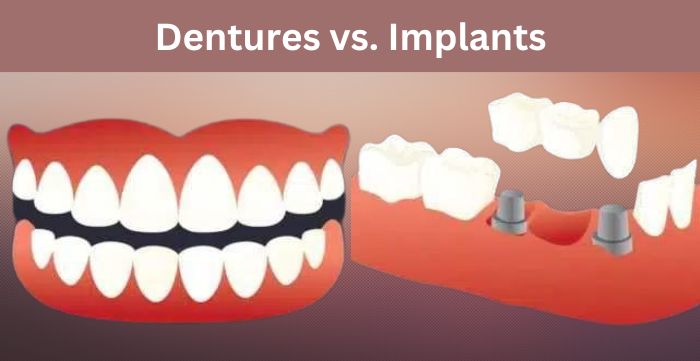
In this blog post, we’ll look at the differences between dentures and implants so that you can make an informed decision about which option is best for you to achieve a more beautiful smile.
This is just a general overview — for more specific information, consult your dentist.
What to Consider When Choosing Dental Implants vs. Dentures
When replacing missing teeth, patients have multiple options to choose from.
Two of the most popular choices are dental implants and dentures. Dentures and implants replace missing teeth, but each has distinct advantages and disadvantages.
Patients need to consider all factors before making a decision.
Dentures vs. Implants
Dentures have been around for centuries and are a tried-and-true option for tooth replacement. There are different types of dentures, and they are used by patients who are looking for an affordable option to replace missing teeth.
Dental implants are a more modern tooth replacement option that involves surgical placement of titanium posts into the jawbone.
The posts fuse with the bone over time, acting as artificial tooth roots while providing a strong and stable foundation for artificial teeth (dental crown). Implants also come in different types.
The best tooth replacement option for each patient depends on various factors, including your budget, timeframe, comfort level, and lifestyle.
Cost of Dentures vs. Implants
When choosing between dentures and implants, the cost is often a deciding factor. Dentures are typically less expensive up front, while implants require a more considerable financial investment.
However, comparing each option’s long-term costs is important before deciding.
Dentures will need to be replaced periodically as they wear down, which can add up over time. In contrast, dental implants are designed to last a lifetime with proper care.
Additionally, implants help preserve bone mass in the jaw, preventing the sunken appearance that often occurs with dentures.
As a result, implants may actually save you money in the long run while also providing superior function and aesthetics.
Maintenance of Dentures vs. Implants
There are two main options for tooth replacement – dentures and implants. Both require some maintenance, but there are significant differences between the two.
Dentures must be removed and cleaned daily, and they should be checked for fit every few years.
In addition, dentures can become stained and may need to be replaced every 5-10 years.
Dental implants, on the other hand, are a more permanent solution to tooth loss and require no special care beyond regular brushing and flossing. However, they do require a surgical procedure for placement, and they may not be an option for everyone.
Benefits of Dentures vs. Implants
The benefits of dentures vs. dental implants are as follows:
- Dentures can be removed for cleaning, while dental implants are permanently fixed in the mouth
- Dentures may need to be replaced every 5-10 years, while dental implants typically last a lifetime
- Dentures may cause some discomfort and speech difficulties, while dental implants are typically very comfortable and do not affect speech
- Dentures may slip or fall out, while dental implants are very secure
- Dentures don’t feel as natural, while dental implants look and feel like natural teeth
- Dentures may require special care and cleaning products, while dental implants require no special care beyond regular brushing, making it easier to maintain good oral health
Complications from Dentures vs. Implants
When it comes to choosing the right tooth replacement option, there are a lot of factors to consider. For many people, the most important consideration is the risk of complications.
Dentures and dental implants are both popular options, but which one is more likely to cause complications?
Generally speaking, dental implants are less likely to cause complications than dentures. This is because implants are directly anchored into the jaw bone, making them much more stable than dentures, which can sometimes slip or shift.
Additionally, implant surgery is generally very safe and effective, with a low risk of infection or other complications. However, it’s important to note that every surgical procedure carries some risk, so there is always a chance of complications with dental implants.
Dentures, however, tend to have a higher rate of complications than dental implants. They are not as securely attached to the mouth and can shift or slip more easily.
Additionally, dentures require more maintenance than implants and can sometimes become stained or discolored.
However, the most significant complication associated with dentures is that they can cause irritation and soreness in the mouth.
In some cases, this can even lead to infections.
Overall, then, dental implants tend to be a safer and more effective option than dentures.
The Bottom Line
Dentures and dental implants are viable options if you are considering tooth replacement. However, there are some key differences between the two that you should take into account.
Ultimately, the best option for tooth replacement will vary depending on what you need and what will significantly improve your quality of life.